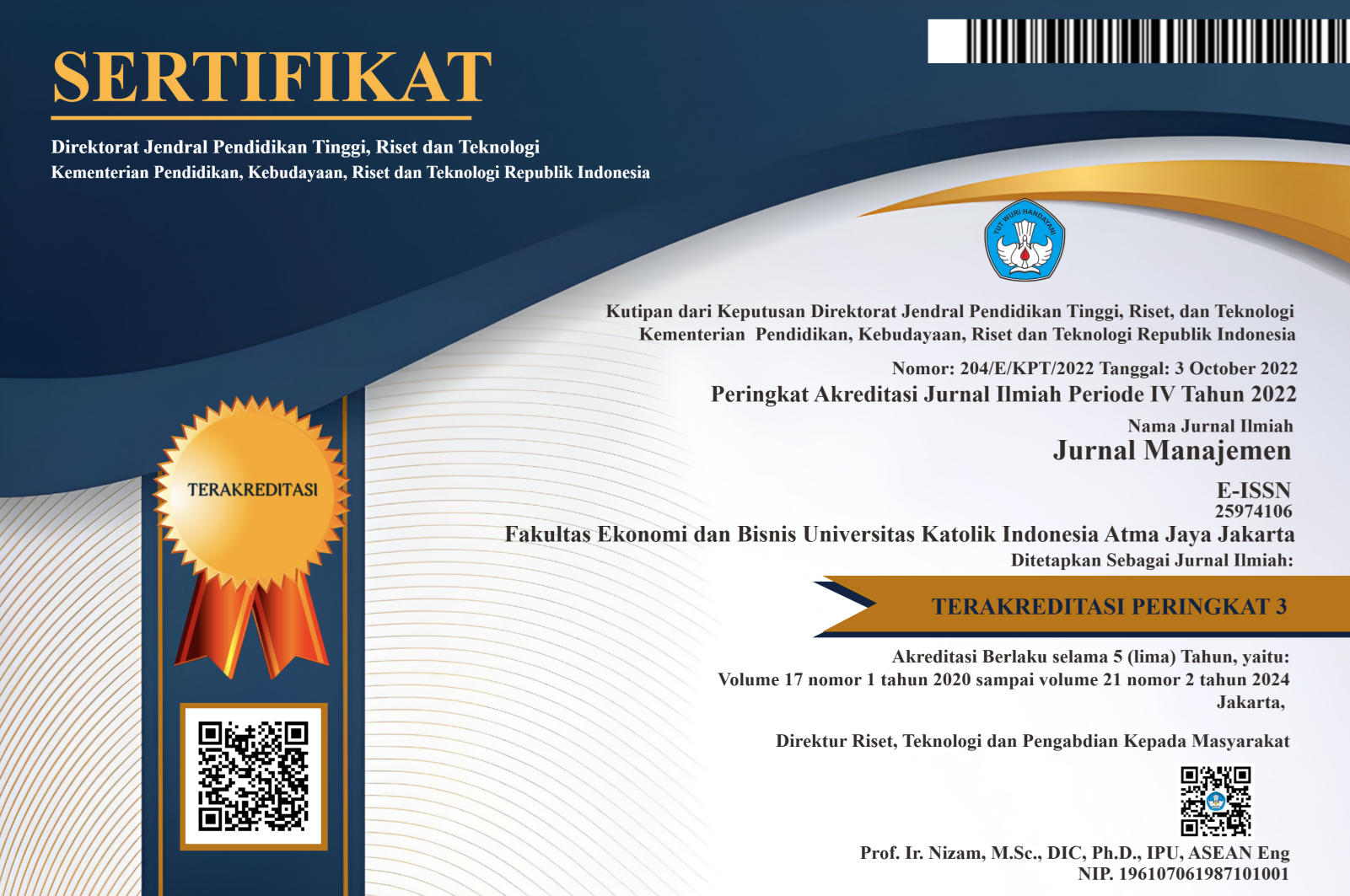EFEK MEDIASI DARI PENGEMBANGAN KARIR PADA PENGARUH PELATIHAN DAN PENGEMBANGAN TERHADAP KEPUASAN KERJA DI PT PLN (PERSERO) PUSAT
DOI:
https://doi.org/10.25170/jm.v12i1.822Keywords:
Pelatihan dan Pengembangan, Kepuasan Kerja, Pengembangan KarirAbstract
The purpose of this research is to test the effect mediation of career development on the influence of training and development toward to job satisfaction at PT PLN (PERSERO) Pusat. Data collected using a purposive sampling. There are 80 respondents used as participants. The path analysis is used by analytical tools of Preacher-Hayes the Simple Mediation Model with SPSS 22 for mac with macro and syntax. This research findings that the career development has mediating effect on the influence of training and development toward job satisfaction.
References
Bianca, A., & Susihono, W. (2012). Pengaruh Iklim Organisasi dan Pengembangan Karir terhadap Kepuasan Kerja Karyawan. Spektrum Industri, 2012, 10 (2).
Cheng, D.S.Y. (2014). How to Improve the Training and Development Process of Corporate Bankers. The Journal of Human Resource and Adult Learning, 10 (2).
Chiaro, S.A.D. (2006). The Effect of Training Supervisors to Use Positive Verbal Reinforcement on Employee Job Satisfaction. The Faculty of the School of Education Counseling Psychology Department.
Choo, S. & Bowley, C. (2007). Using Training and Development to Affect Job Satisfaction within Franchising. Journal of Small Business and Enterprise Development, 14 (2).
CHR. Jimmy L.G. (2014). A to Z Human Capital Sumber Daya Manusia. Jakarta: PT Grasindo Anggota Ikapi.
Fahmi, I. (2014). Perilaku Organisasi Teori, Aplikasi, dan Kasus. Bandung: Alfabeta.
Greenhaus, Jeffrey H., Callanan, G. A., & Godshalk, V. M. (2000). Career Management (Third Edition). Harcourt College Publishers.
Hayes, A.F. (2013). Introduction To Mediation, Moderation, And Conditional Process Analysis A Regression – Based Approach (Series Editor’s Notes by Little, D.T). New York: The Guilford Press.
Kim, S. (2002). Organizational Support of Career Development and Job Satisfaction. Review of Public Personnel Administration, 22 (4), 276-294.
Mangkunegara, A.P. (2005). Manajemen Sumber Daya Perusahaan (Cetakan Kelima). Bandung: PT. Remaja Rosdakarya.
Mondy, R,W. (2008). Manajemen Sumber Daya Manusia (Jilid I Edisi 10). Jakarta: Erlangga.
Moris, S.H., & Sreedhara, T.N. (2011). Employee Satisfaction With Career Development Practice : A Comparative Study Of Indian and Foreign MNC BPO Firms. Journal of Arts Science & Commerce Vol.– II, Issue –1.
Mutmainah, H. (2013). Pengaruh Kompensasi, Pelatihan, dan Peran Supervisor Terhadap Kinerja yang Dimediasi oleh Kepuasan Kerja pada Karyawan Paguyuban Batik Laweyan Surakarta. GRADUASI, 29.
Nelson, D.L., & J.C., Quick, (2006). Organizatonal Behavior Foundations Realities and Challenges. United States of America: Thompson South Western.
Noe, R.A., Hollenbeck, J.R., Gerhart, B., & Wright, P.M. (2006). Human Resources Management. New York: Mc Graw-Hill.
Noe, R.A., Hollenbeck, J.R., Gerhart, B., & Wright, P.M. (2010). Human Resources Management: Gaining a Competitive Advantage. New York: Mc Graw-Hill.
Preacher, K.J., & Hayes, A.F. (2008). Asymptotic and Resampling Strategies for Assessing and Comparing Indirect Effects in Multiple Mediator Models. Behavior Research Methods, 40 (3), 879-891.
Rivai, Veitzal. (2004). Manajemen Sumber Daya Manusia Untuk Perusahaan. Jakarta: PT Raja Grafindo Persada.
Robbins, S.P., & T.A., Judge. (2009). Organizational Behavior. New York: Pearson Prentice Hall.
Spector, P.E. (1985). Measurement of Human Service Staff Satisfaction: Development of the Job Satisfaction Survey. American Journal of Community Psychology, 13 (6).
Sugiyono. (2009). Metode Penelitian Bisnis (Pendekatan Kuantitatif, Kualitatif, dan R&D). Bandung: Pnerbit Alfabeta.
Downloads
Published
Issue
Section
License
Authors who publish with this journal agree to the following terms:
Authors retain copyright and grant the journal right of first publication with the work simultaneously licensed under a Creative Commons Attribution-NonCommercial-ShareAlike License that allows others to share the work with an acknowledgement of the work's authorship and initial publication in this journal.
Authors are able to enter into separate, additional contractual arrangements for the non-exclusive distribution of the journal's published version of the work (e.g., post it to an institutional repository or publish it in a book), with an acknowledgement of its initial publication in this journal.
Authors are permitted and encouraged to post their work online (e.g., in institutional repositories or on their website) prior to and during the submission process, as it can lead to productive exchanges, as well as earlier and greater citation of published work (See the Effect of Open Access).












